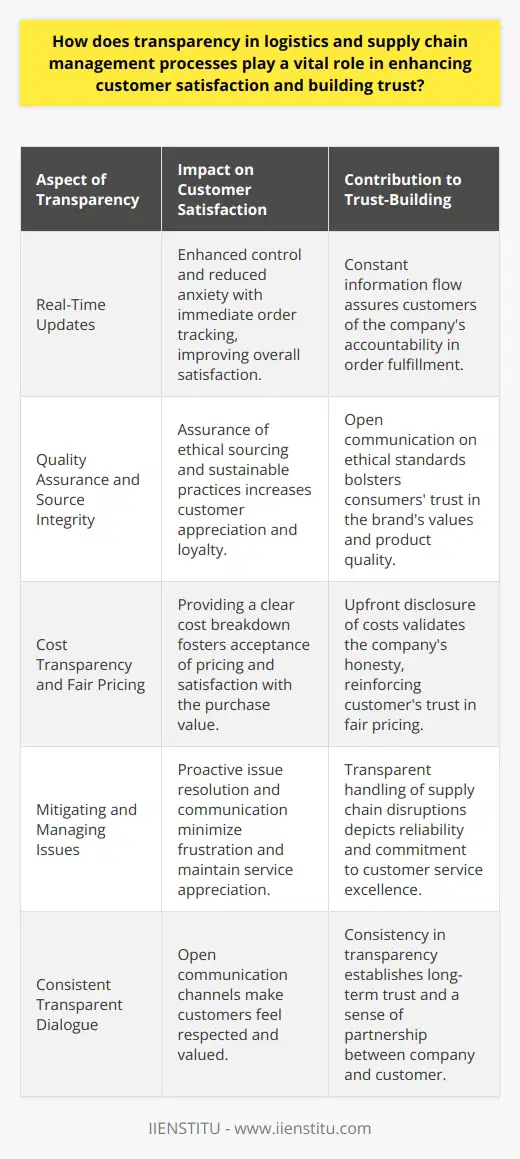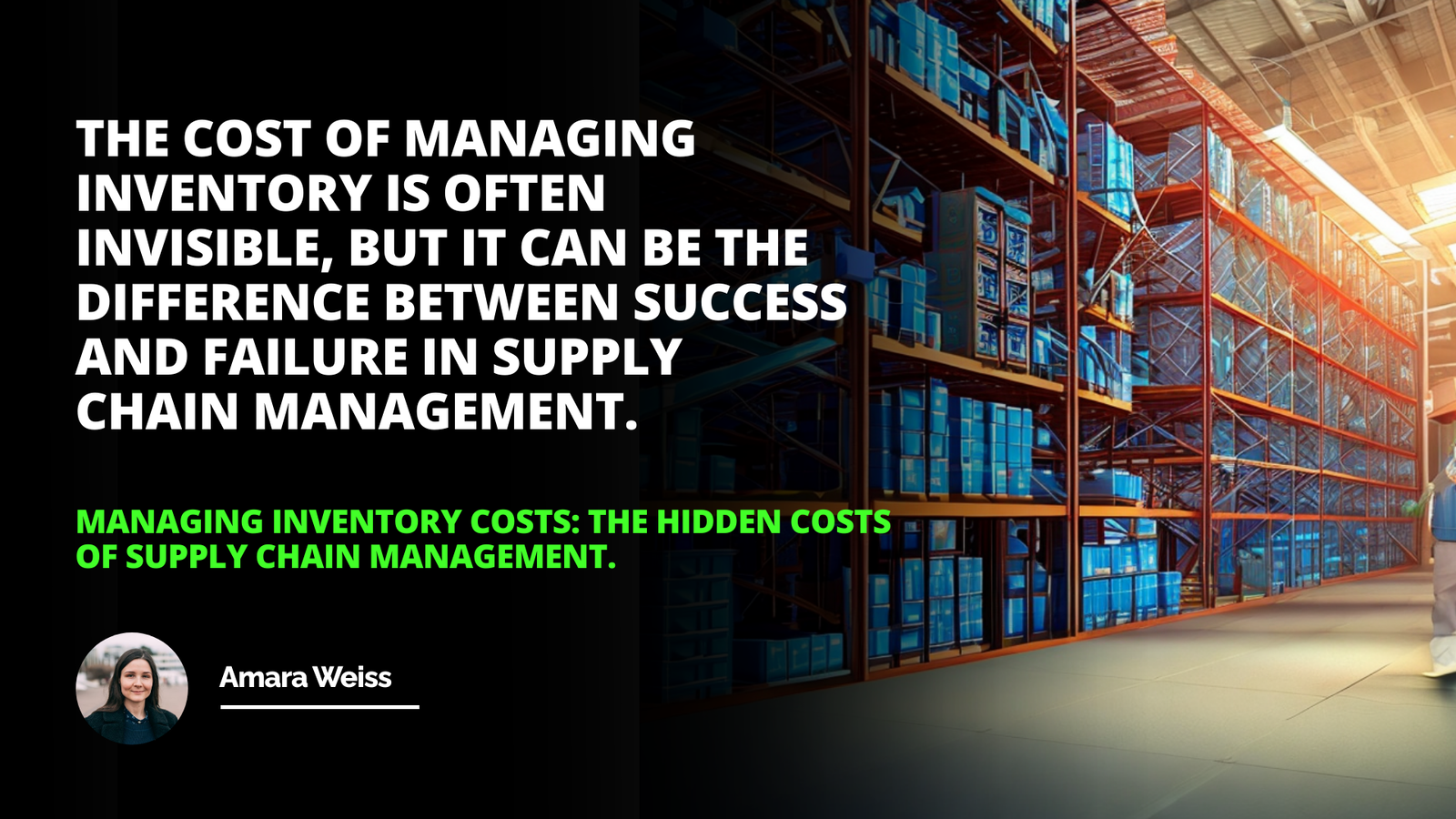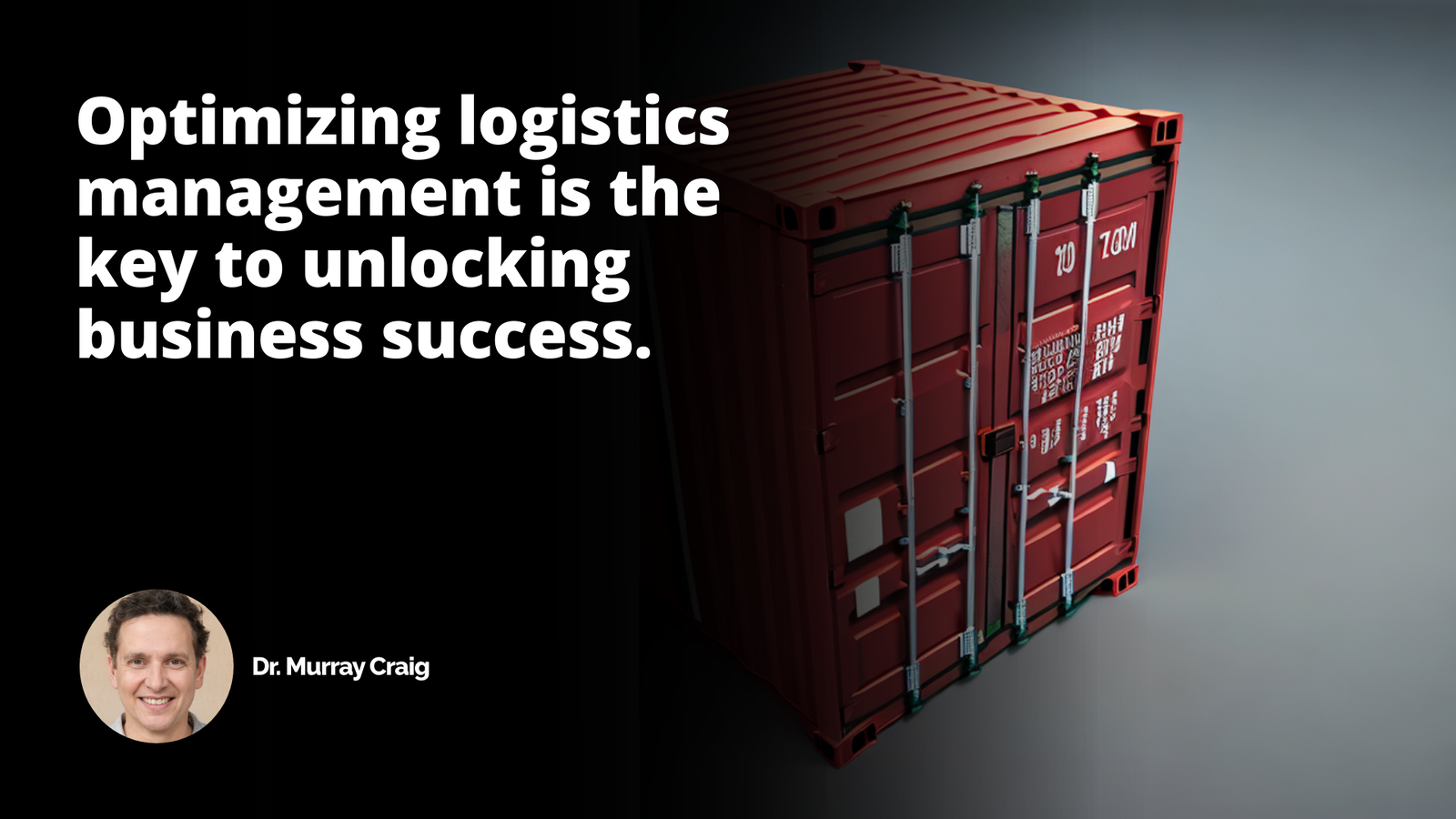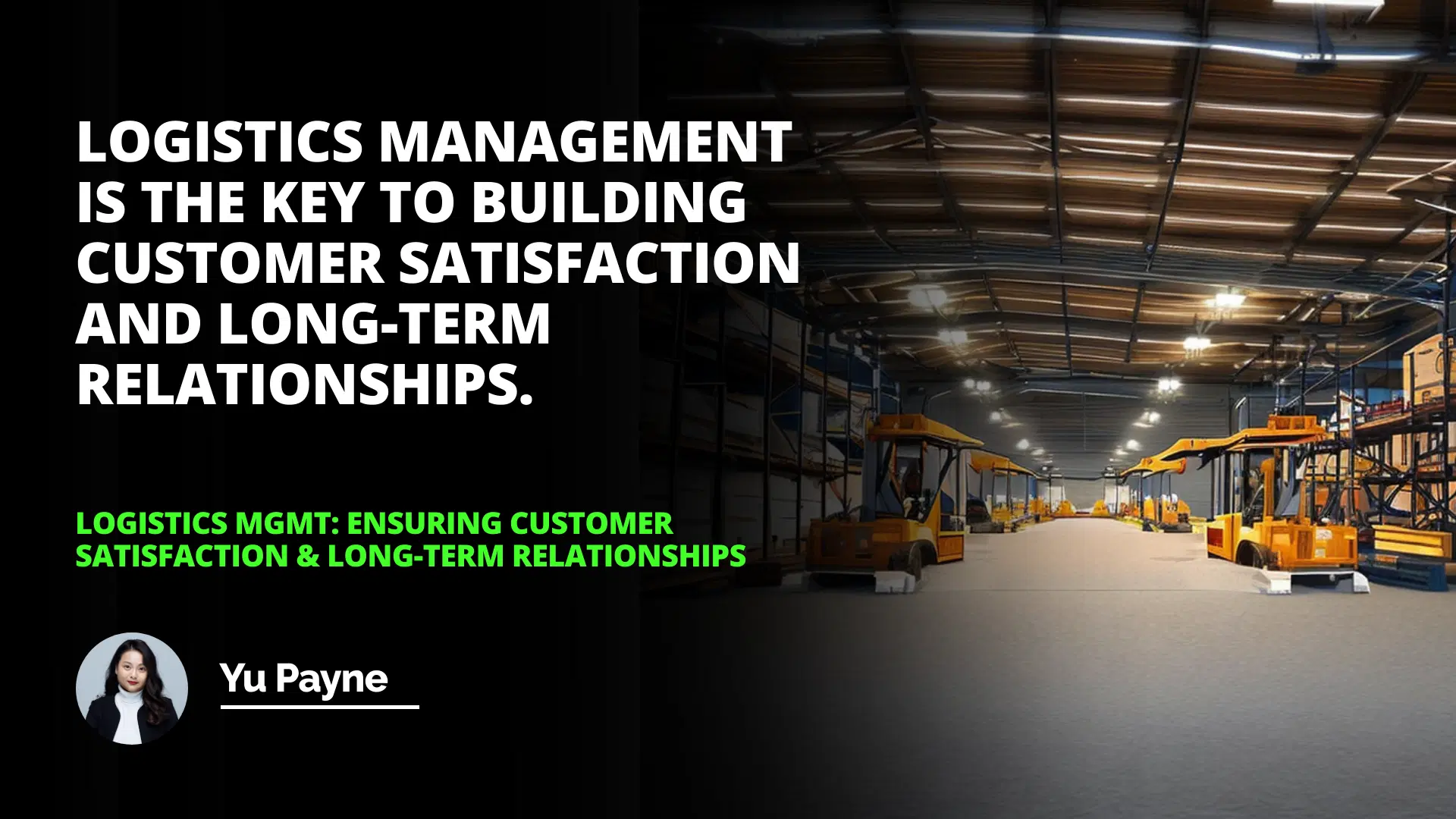
Logistics management is a vital component of any business, as it involves the planning, implementing, and controlling of the movement of goods and services from the point of origin to the point of consumption. It provides numerous benefits, such as improved customer satisfaction, enhanced product quality, and cost savings. However, some challenges must be addressed, such as the cost of resources and complex technical issues. With proper management, logistics management can help businesses increase customer satisfaction and build long-term relationships.
Related Course: Logistics Certificate Programs
Introduction
Product Installation, Commissioning, and Technical Snags
Benefits of Logistics Management
Challenges of Logistics Management
Conclusion
Logistics Management: Benefits and Challenges
Logistics management is a crucial component of any business, as it ensures that products and services are delivered to customers promptly and efficiently. Logistics management encompasses the planning, implementation, and control of the movement of goods and services from the point of origin to the point of consumption. This article will discuss the benefits and challenges of logistics management, particularly regarding customer satisfaction and long-term relationships.
Product Installation, Commissioning, and Technical Snags.
The installation and commissioning of technically complex products is an essential step in the logistics management process. It requires the commitment of resources to ensure that the product is properly installed and commissioned and that any technical snags are addressed during the warranty period. After-sales service departments are typically responsible for handling all documentation, customer technical complaints, product installation, commissioning, stabilization, and handing over.
Benefits of Logistics Management.
The benefits of logistics management are numerous. Properly managed logistics can lead to improved customer satisfaction, as customers receive their products and services promptly and efficiently. Furthermore, logistics management can improve product quality, as products are handled with care and stored in optimal conditions. Logistics management can also help reduce costs, as it allows for the optimization of resources and reduces wasted time.
Unleashing the Power of Logistics for 30-Minute Pizza Delivery
Analyzing the Impact of Gross Margin Return on Investment (GMROI)
Challenges of Logistics Management.
Despite the many benefits of logistics management, some challenges exist. The most significant challenge is the cost of resources. Logistics management requires a significant investment of resources in terms of personnel and equipment. Additionally, there are often complex technical issues that must be addressed to ensure the smooth running of the logistics process.
Conclusion: Logistics management is an essential component of any business. It offers numerous benefits, such as improved customer satisfaction, enhanced product quality, and cost savings. However, some challenges must be addressed, such as the cost of resources and complex technical issues. Nevertheless, when properly managed, logistics management can be a powerful tool for businesses to increase customer satisfaction and build long-term relationships.
Logistics management is the key to building customer satisfaction and long-term relationships.
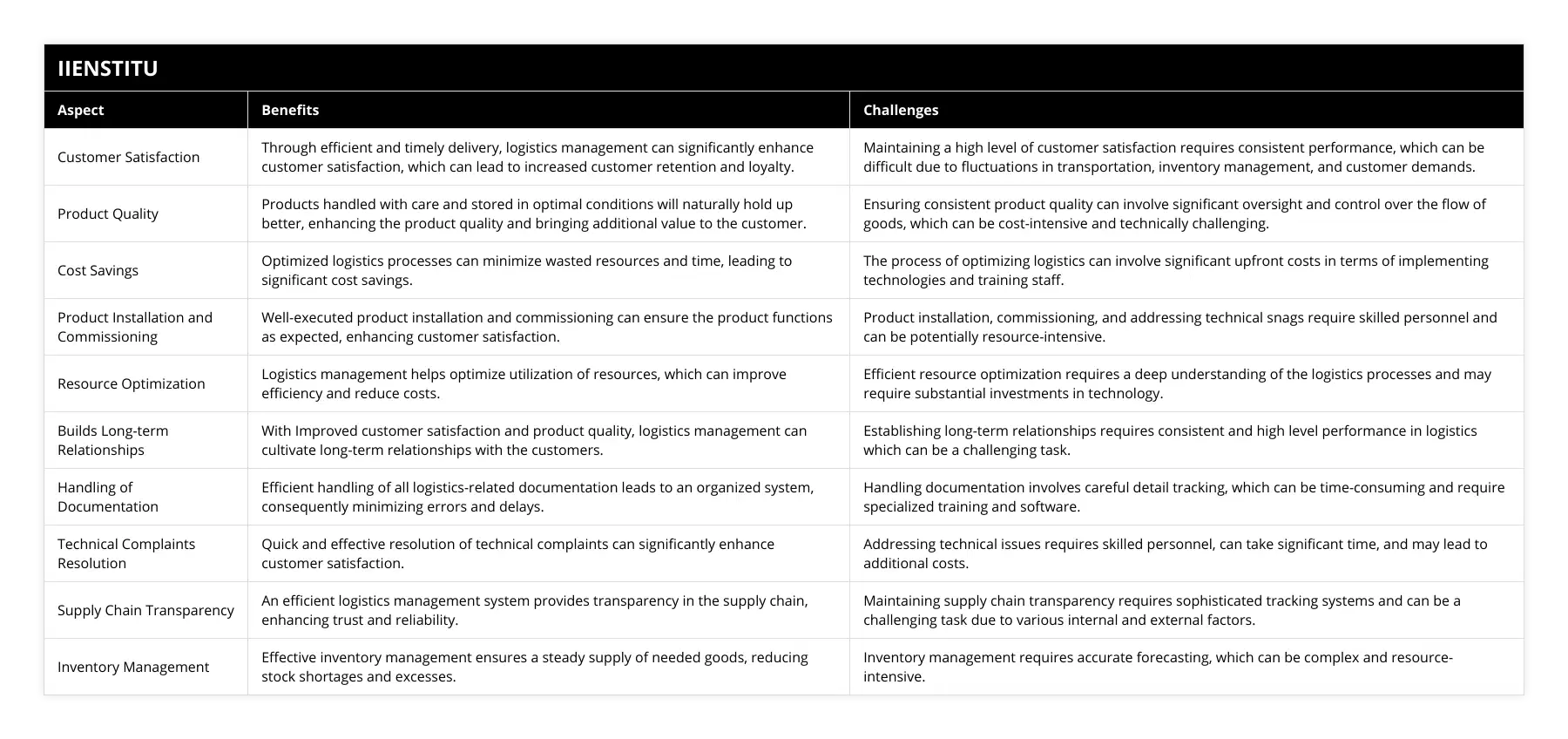
Frequently Asked Questions
What strategies can be employed to ensure customer satisfaction and long-term relationships in logistics management?
Logistics management is a critical component of any business, as it ensures the efficient delivery of goods and services to the customer. The quality of the customer’s experience is often dependent on the efficiency of the logistics process. Therefore, customer satisfaction and long-term customer relationships must be a priority for any business. This article discusses some strategies that can be employed to ensure customer satisfaction and long-term relationships in logistics management.
The first strategy is to ensure that customers are given accurate information regarding their orders and shipments. Providing customers with accurate delivery times, tracking information, and other relevant information can help build trust and keep customers informed. This can also help to reduce customer queries and complaints, as they will have all the information they need at their fingertips.
The second strategy is to ensure that customer service is responsive and customer-focused. Having a customer service team that is available to answer customer queries and complaints quickly and efficiently can help to ensure customer satisfaction and build customer loyalty. Additionally, customer service should be focused on anticipating customer needs and providing solutions as quickly as possible.
The third strategy is to provide customers with flexible delivery options. Allowing customers to choose a delivery option that is most suitable for them can help to ensure that their orders are delivered on time and in a manner that is convenient for them. This can also help to build customer satisfaction and loyalty. Customers should also be allowed to track their orders in real-time to provide them with peace of mind and transparency.
The fourth strategy is to ensure that all shipments are handled with care. Ensuring that all shipments are handled with maintenance can help to ensure that all orders are delivered in perfect condition and on time. This can help to reduce customer complaints and increase customer satisfaction. Additionally, providing customers with detailed information regarding the shipment process can help to ensure that they are kept informed and can track their orders in real time.
In conclusion, customer satisfaction and long-term customer relationships are essential to any business, and it is vital to employ strategies to ensure these goals are met. These strategies include providing accurate information, responding to customer queries quickly and efficiently, providing flexible delivery options, and ensuring that all shipments are handled with care. Implementing these strategies can help to ensure customer satisfaction and build long-term customer relationships.
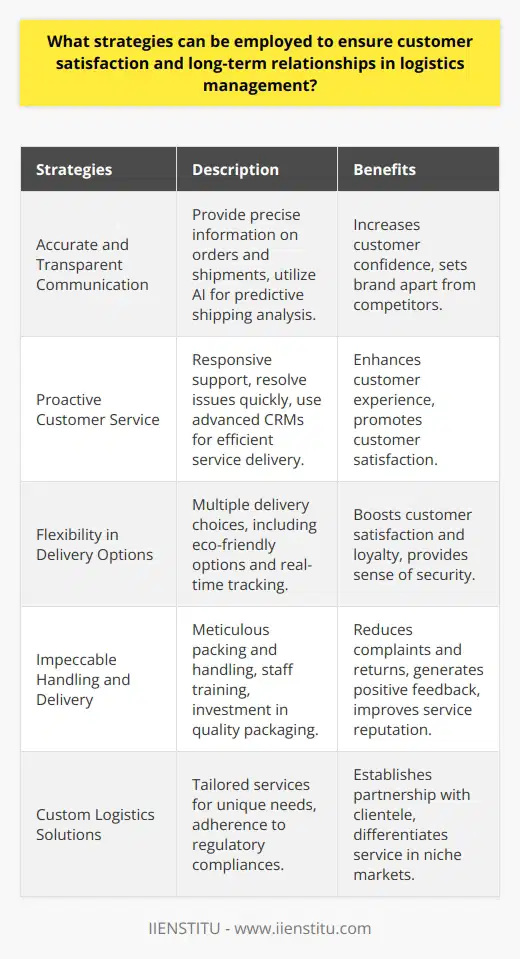
How can product installation, commissioning and technical snags be addressed in logistics management?
Logistics management involves coordinating multiple activities, such as product installation, commissioning, and technical snags. Efficiently addressing these issues is critical to the success of any business. This article will explore how product installation, commissioning, and technical snags can be addressed in logistics management.
Product installation is a crucial step in the logistics management process. A successful installation requires an effective plan which must be carefully crafted. The plan should consider the product's characteristics, such as size, weight, and complexity, and should also include a detailed timeline for the installation process. It is also essential to ensure that the installation team is adequately trained and experienced in the installation process.
Commissioning is testing the product to ensure it is functioning correctly and is ready for use. This process involves running tests to ensure that the product is working correctly and is ready for use. It is essential to ensure that the commissioning process is conducted thoroughly, as any errors in the process can result in costly delays and rework.
Finally, technical snags are inevitable in any logistics management system. Technical snags can arise due to a variety of factors, including errors in the installation process, incorrect commissioning of the product, or simply due to wear and tear. Identifying the nature of the snag quickly and resolving it swiftly to minimize disruption is essential. A comprehensive technical support system should be in place to ensure that technical obstacles can be addressed quickly and efficiently.
In conclusion, product installation, commissioning, and technical snags can all be addressed effectively in logistics management. An effective plan must be created for product installation, and the commissioning process must be conducted thoroughly. Additionally, a comprehensive technical support system must be in place to quickly address any technical snags that may arise. By ensuring that these steps are taken, businesses can ensure that their logistics management system is efficient and effective.
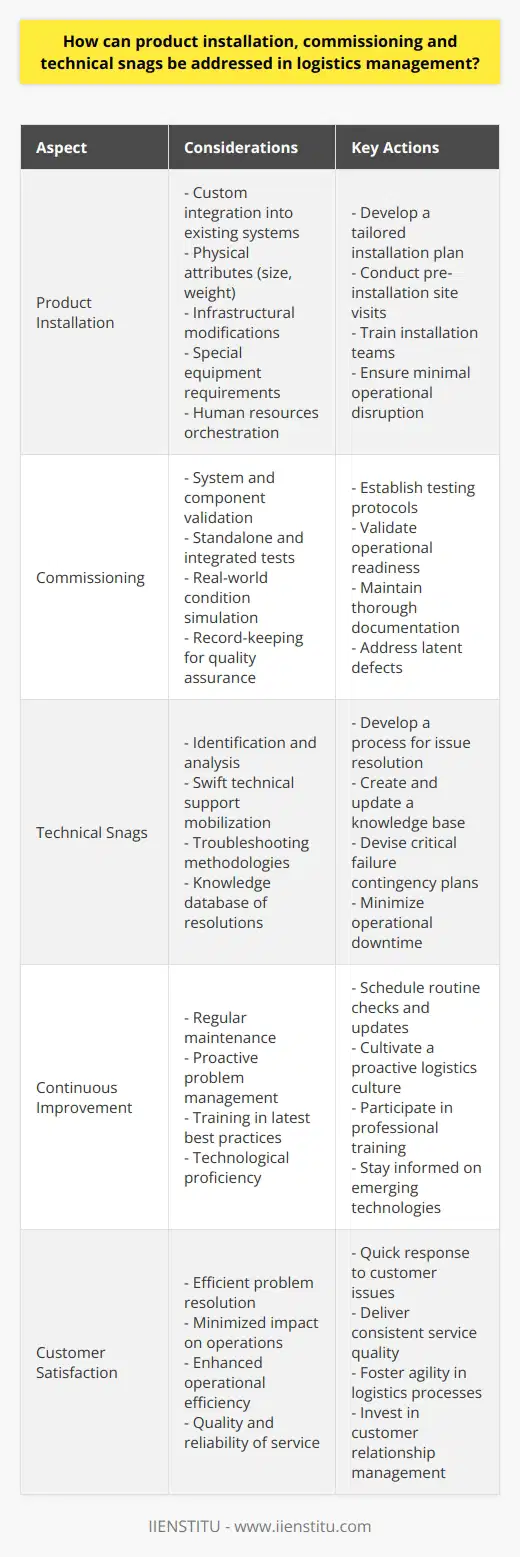
What are the benefits and challenges of implementing logistics management?
Logistics management is a critical component of any modern supply chain. It involves coordinating the flow of goods and services from supplier to customer and managing inventory, warehousing, and transportation. With its broad scope and importance, there are numerous benefits and challenges associated with implementing logistics management.
The primary benefit of implementing logistics management is cost savings. Logistics managers can reduce overhead costs by optimizing the supply chain, such as unnecessary inventory, warehousing, and transportation. Also, logistics management helps streamline operations, improving efficiency and productivity. Furthermore, logistics can increase customer satisfaction by ensuring timely delivery and improving order accuracy.
Despite the many advantages of logistics management, there are also several challenges associated with its implementation. For example, managing multiple suppliers, customers, and warehouses effectively can be difficult. Additionally, implementing logistics management requires significant investment in technology and infrastructure. Furthermore, it can be difficult to forecast demand accurately and ensure that customer orders are fulfilled promptly.
In conclusion, logistics management offers numerous advantages and can significantly improve supply chain efficiency and customer satisfaction. However, it also presents several challenges that must be addressed to realize its full potential. Ultimately, the decision to implement logistics management should be based on careful consideration of the potential costs and benefits.
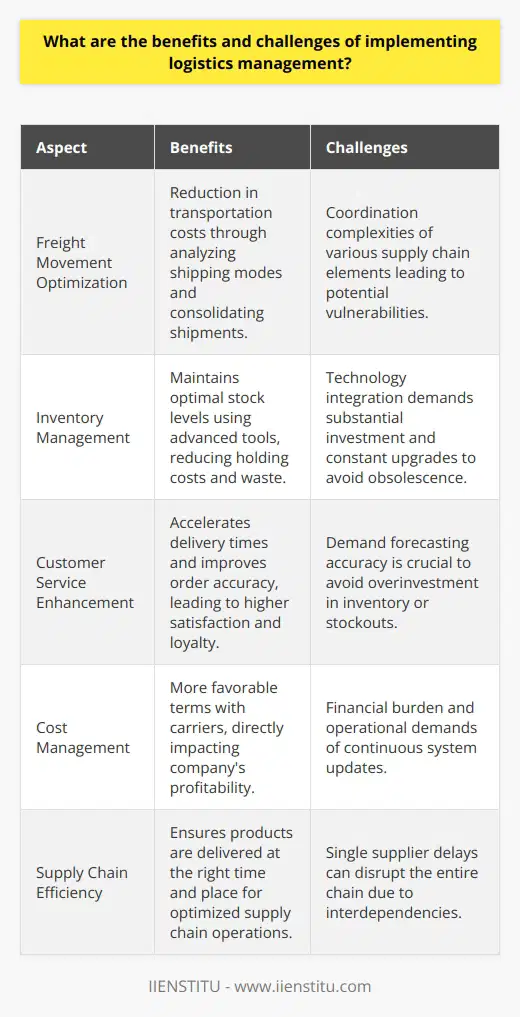
How can an efficient logistics management system enhance customer satisfaction?
Enhancing Customer Satisfaction through Logistics Management
Efficient logistics management plays a critical role in improving customer satisfaction. By ensuring smooth and timely delivery of products, companies can enhance their reputation and build customer loyalty. In addition, a well-functioning logistics system allows businesses to respond promptly to customer demands and provide quality after-sales service.
Timely and Accurate Delivery
Efficient logistics management systems ensure on-time deliveries and accurate order fulfillment. Customers appreciate receiving their orders in a timely manner and with minimal errors, leading to improved satisfaction and strengthened relationships. By implementing advanced technologies, such as automated tracking systems, businesses can continually monitor and optimize their logistics processes.
Inventory Control
Effective inventory control contributes to customer satisfaction by preventing stockouts and ensuring product availability. Sufficient stock levels and accurate forecasting allow businesses to fulfill orders quickly, reducing lead times and improving customers' overall experience. Efficiently maintaining appropriate stock levels can also reduce costs, enabling companies to pass savings along to their customers.
Effective Communication
Clear and transparent communication is integral to efficient logistics management and customer satisfaction. Proactive communication regarding order status, potential delays, and transparent information about product availability can foster trust and create a positive customer experience. Businesses that maintain open lines of communication demonstrate their commitment to addressing customers' needs and concerns throughout the entire purchasing process.
Responsiveness to Customer Demands
Logistic management systems that accommodate varying customer demands, such as special handling requirements or expedited shipping, can significantly enhance customer satisfaction. Businesses that adapt their logistics strategies to meet these unique expectations demonstrate their commitment to accommodating individual preferences and providing a personalized customer experience.
Quality After-Sales Service
An efficient logistics management system not only ensures a smooth delivery process but also supports after-sales service, like handling returns and addressing customer queries. A streamlined returns process, coupled with responsive customer support, can lead to increased customer satisfaction and loyalty.
In conclusion, efficient logistics management is crucial for businesses looking to enhance customer satisfaction. By facilitating timely deliveries, managing inventory effectively, maintaining open communication, adapting to customer demands, and providing quality after-sales service, companies can improve their customers' experience and encourage long-term loyalty.
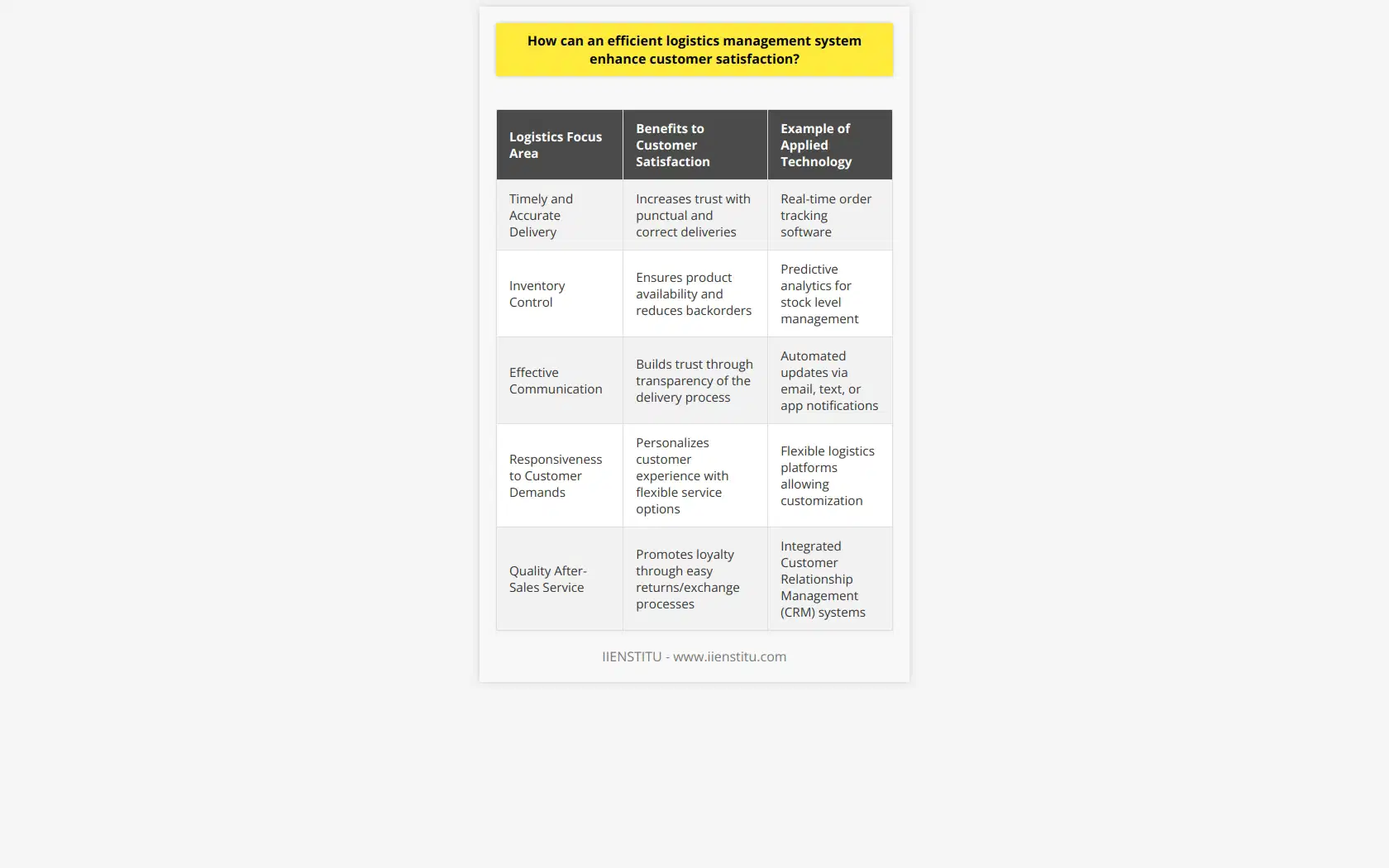
What role does effective supply chain management play in achieving high levels of customer satisfaction?
Role of Supply Chain Management
Effective supply chain management (SCM) plays a significant role in achieving high levels of customer satisfaction through various means. Firstly, it ensures timely delivery of products and services or even exceeding customer expectations in terms of delivery speed. Meeting deadlines and providing prompt deliveries are essential components of customer satisfaction.
Inventory Management
SCM also involves proper inventory management, which helps satisfy customer needs by preventing stockouts or surplus. Efficiently maintaining inventory levels allows companies to meet customer demands while minimizing costs associated with warehousing and stock obsolescence. This contributes to overall customer satisfaction by ensuring the availability of desired products when customers need them.
Quality Assurance
In addition, effective SCM improves product quality and consistency through standardized processes and quality control measures. Ensuring high-quality products reduces the likelihood of customer complaints and returns, consequently bolstering customer satisfaction. Moreover, implementing quality assurance mechanisms throughout the supply chain enables companies to identify and remedy defects or inconsistencies early in the production process, preventing them from reaching the end customer.
Cost Reduction
Cost reduction is another benefit of effective SCM that directly impacts customer satisfaction. By streamlining operations and reducing waste, companies can lower production costs which may be passed on to consumers as lower prices or reduced delivery fees. Lower costs can be an attractive factor for customers, making them more likely to purchase from or continue doing business with a company that offers competitive pricing.
Sustainable Practices
Lastly, effective SCM enables companies to adopt sustainable practices, which can lead to higher customer satisfaction among environmentally conscious consumers. Through efficient resource utilization, waste reduction, and responsible sourcing, SCM contributes to a company’s sustainability initiatives. In turn, companies that demonstrate a commitment to sustainability may generate increased customer loyalty and positive brand perception.
Conclusion
In summary, effective supply chain management contributes to high levels of customer satisfaction through timely delivery, proper inventory management, quality assurance, cost reduction, and sustainable practices. As businesses increasingly recognize the benefits of optimizing their supply chain, its role in enhancing customer satisfaction will only continue to grow.
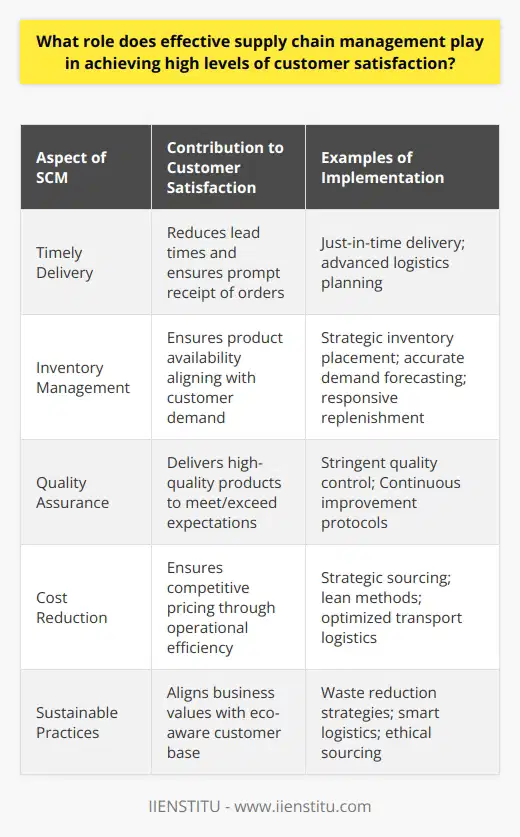
How can logistics managers optimize their operations to ensure optimal customer satisfaction and loyalty?
Logistics Optimization Strategies
One way logistics managers can optimize their operations to ensure optimal customer satisfaction and loyalty is through the implementation of effective supply chain management practices, such as demand forecasting and inventory management. Accurate demand forecasting allows businesses to predict customer needs, thus ensuring that orders are fulfilled on time while reducing warehousing and transportation costs. Furthermore, efficient inventory management helps to maintain an adequate level of stock to minimize stockouts, keeping customers satisfied while also preventing oversupply issues.
Technological Advancements
Logistics managers can also leverage technology to bolster customer satisfaction and loyalty. There is a significant potential for the use of technologies such as the Internet of Things (IoT), machine learning, and automation in inventory management and shipment tracking. These tools help to optimize the supply chain by providing real-time data on inventory levels, shipment tracking, and demand projections, enabling managers to make better-informed decisions. Additionally, by employing technology to streamline operations, businesses can reduce human error, ensuring that orders are fulfilled quickly and without mistakes, thus enhancing customer satisfaction.
Improving Communication
Establishing clear communication channels both within the company and with customers is crucial for high customer satisfaction and loyalty. Collaboration and effective communication among logistics team members helps to ensure that operations run smoothly and that issues are addressed promptly, reducing delays and errors. Also, transparent communication with customers about order status, anticipated delivery dates, and potential disruptions allows them to feel more informed and confident in the company's services. This, in turn, fosters trust and loyalty.
Agility and Adaptability
Finally, fostering an agile and adaptable logistics system helps to bolster customer satisfaction and loyalty. Market conditions, demand fluctuations, and unforeseen events can affect the supply chain, and logistics managers who can react to these changes quickly and effectively will ensure that their customers continue to trust in their services. By building agility into their operations, managers are better positioned to navigate disruptions and maintain a high level of customer satisfaction, ultimately leading to lasting loyalty.
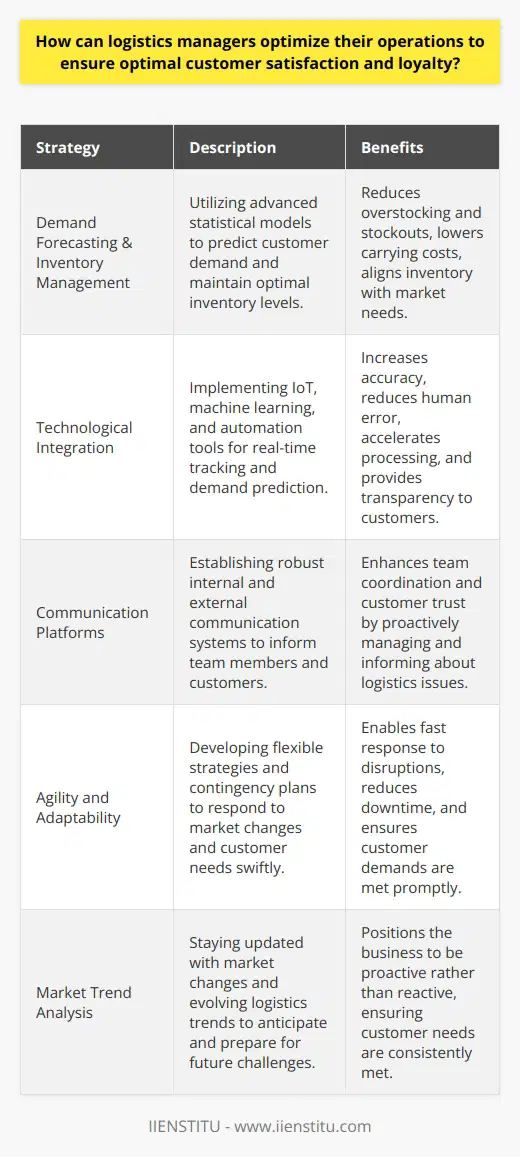
How does logistics management improve customer satisfaction through timely deliveries and efficient inventory management?
**Logistics Management and Customer Satisfaction**
Logistics management plays a vital role in enhancing customer satisfaction by ensuring timely deliveries of products and efficient inventory management. Through the efficient coordination of transportation, warehousing, and inventory handling, logistics management facilitates swift delivery of goods to consumers, thereby meeting their expectations and establishing trust.
**Timely Deliveries**
One of the primary ways logistics management improves customer satisfaction is by enabling organizations to meet delivery deadlines. Companies employing effective logistics management systems can accurately estimate and plan for delivery times, ensuring that customers receive their orders promptly. Punctual deliveries are crucial for maintaining a positive brand image and fostering long-term relationships with customers.
**Inventory Management**
Efficient inventory management is another crucial aspect of logistics management that impacts customer satisfaction. Proper tracking and monitoring of inventory levels enable organizations to maintain adequate stock of the products in demand, ultimately reducing the likelihood of stockouts, product unavailability, or delays in order processing. This diligent management of inventory translates to satisfied customers who can consistently find and receive the products they desire.
**Reduced Costs and Improved Efficiency**
Logistics management also helps organizations optimize their resources and reduce operational costs. By implementing cost-effective strategies, such as warehouse consolidation and optimized routing, businesses can pass these savings onto their customers through lower prices and increased value. This price advantage ultimately contributes to customer satisfaction and loyalty.
**Transparent Communication**
Lastly, logistics management facilitates transparent communication between companies and their customers. With real-time tracking and status updates, organizations can keep their customers informed about their orders' progress, further improving customer satisfaction. This open communication allows for prompt addressing of any issues that may arise during the delivery process, ensuring a seamless customer experience.
In conclusion, logistics management plays an indispensable role in enhancing customer satisfaction through timely deliveries, efficient inventory management, reduced operational costs, and transparent communication. By adopting effective logistics management strategies, businesses can ensure a high level of customer satisfaction, ultimately leading to increased loyalty and long-term profitability.
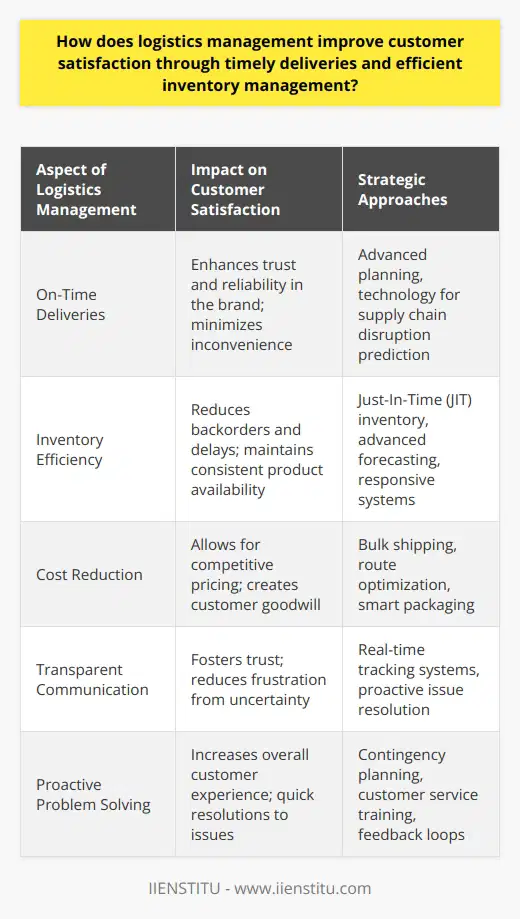
What is the main objective of logistics management in ensuring effective communication and responsiveness to customer needs?
Main Objective of Logistics Management
The primary goal of logistics management is to facilitate efficient and effective communication, ensuring timely responsiveness to the requirements and preferences of customers. In today's highly competitive market, logistics management plays a crucial role in determining the success of a business, as it is directly responsible for the physical flow of goods and delivery of services.
Coordination and Collaboration
To achieve optimal customer satisfaction levels, logistics management focuses on coordinating and collaborating with various stakeholders, such as suppliers, manufacturers, retailers, and end-users. This coordination enables the logistics team to forecast demand accurately, streamline inventory control and establish the necessary measures to fulfill customer orders in a timely fashion.
Real-time Communication and Information Sharing
With advancements in information technology, logistics management now operates as a data-driven discipline that relies on real-time communication and information sharing between different parties involved within the supply chain. Adapting to modern communication channels, such as electronic data interchange (EDI), can greatly enhance the flow of information, resulting in quicker response times to changes in customer needs or market trends.
Flexibility and Adaptability
To maintain a competitive edge, logistics management must be flexible and adaptable, ensuring that customer needs are met efficiently despite any disruptions within the supply chain. This is achieved by implementing contingency plans, risk mitigation strategies, and alternative sourcing options to guarantee continuous flow of goods and services, even during unexpected events or market fluctuations.
Continuous Improvement and Innovation
Finally, logistics management plays an essential role in driving continuous improvement and innovation within the supply chain. Identifying areas for improvement through regular monitoring, evaluation, and analysis of logistics performance fosters process optimization and growth. By adopting innovative technologies and adopting best practices, logistics management can regularly refine its operations, ensuring that customer expectations are met effectively and consistently.
In conclusion, the main objective of logistics management is to ensure effective communication and responsiveness to customer needs through the seamless coordination and collaboration of supply chain partners, real-time information sharing, flexibility, adaptability, and continuous improvement. These components work together to promote a resilient and efficient supply chain that consistently meets or exceeds customer expectations, contributing to the long-term success of any business organization.
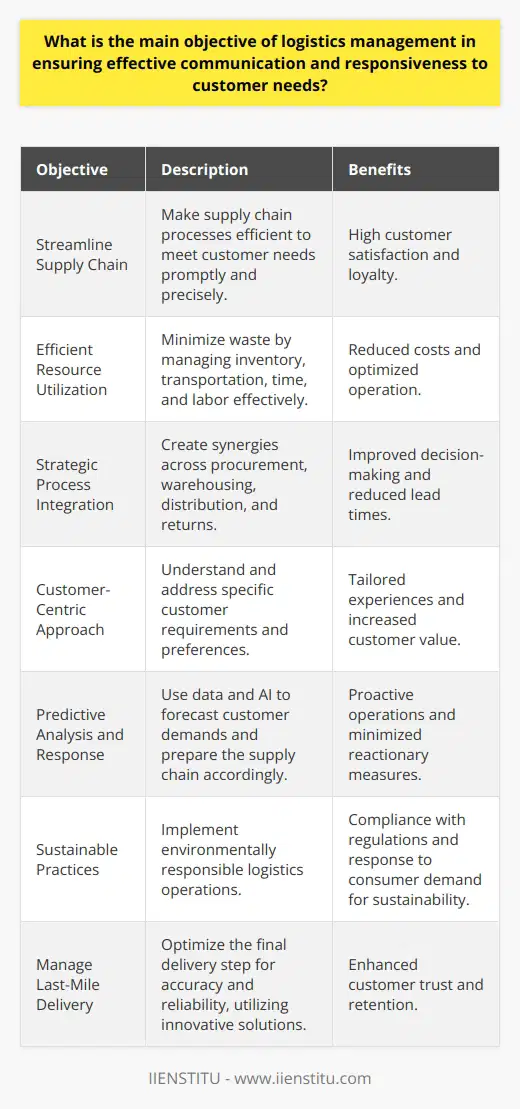
How do logistics and supply chain management collaborate to minimize product returns and consistently meet customer expectations?
Collaboration Between Logistics and SCM
Logistics and supply chain management (SCM) are essential components of delivering excellent customer service in the modern business environment. By working closely together, these two areas can both minimize product returns and ensure customer expectations are consistently met.
Addressing Quality Issues Proactively
One prominent aspect of minimizing product returns is to tackle quality problems before the products reach the customers. Logistics and supply chain managers can achieve this by continuously monitoring and assessing supplier performance. They can identify any potential manufacturing or packaging issues and resolve them quickly to avoid customer dissatisfaction.
Efficient Distribution Network
An efficient distribution system is crucial in meeting customer expectations. By collaboratively designing a well-connected network, logistics and SCM can ensure timely deliveries and maintain accurate inventory levels. This collaboration enables companies to avoid stockouts and backorders, leading to increased customer satisfaction.
Synchronized Communication
Effective communication between logistics and SCM is vital in streamlining operations throughout the supply chain. By sharing information on customer demands, product availability, and estimated delivery times, both departments can better align their strategies to anticipate potential issues and coordinate appropriate actions. This collaboration results in proactive problem-solving and prevents unnecessary product returns.
Leveraging Data Insights
The use of data analytics in logistics and SCM allows companies to gain insights into customer preferences and behavior. By leveraging this knowledge, they can optimize product offerings, pricing strategies, and delivery options that cater to customers' specific requirements. This adaptability enhances the customer experience and reduces the likelihood of product returns.
Continuous Improvement
Lastly, logistics and SCM should work together to constantly evaluate and enhance their performance. They can conduct regular reviews and utilize customer feedback to identify areas for improvement. By implementing best practices and innovative solutions, they can minimize product returns and continuously meet customer expectations.
In conclusion, a strong collaboration between logistics and supply chain management is essential in reducing product returns and consistently meeting customer expectations. By proactively addressing quality issues, designing efficient distribution networks, fostering synchronized communication, leveraging data insights, and pursuing continuous improvement, companies can optimize their supply chain performance and drive customer satisfaction.
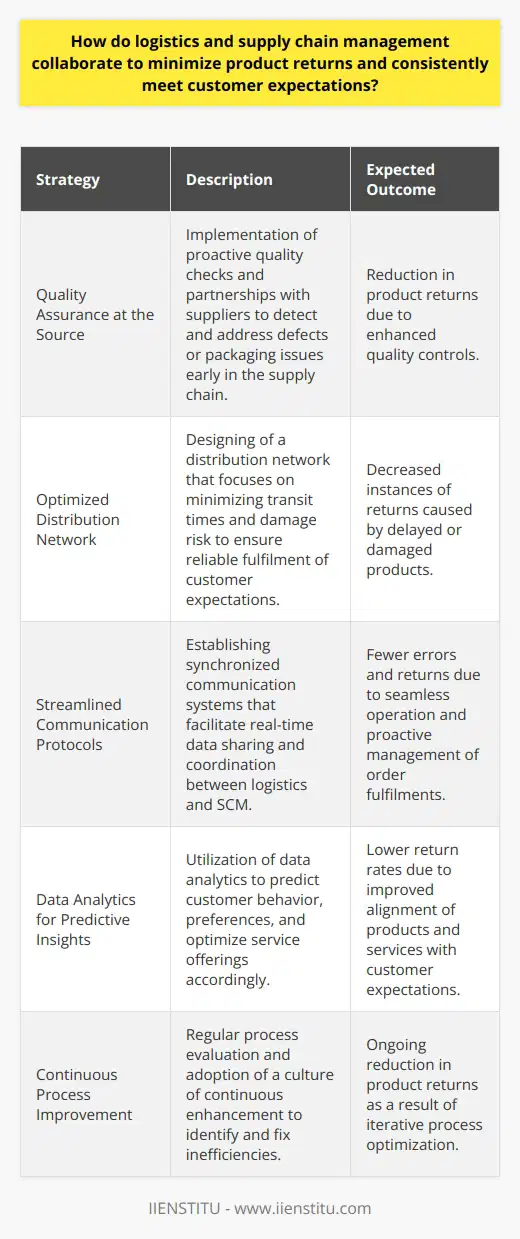
How does logistics management contribute to customer satisfaction by reducing lead times and ensuring product availability?
Lead Time Reduction in Logistics Management
An efficient logistics management system significantly contributes to customer satisfaction by reducing lead times. Prompt delivery is key in attracting and retaining customers. For businesses, a skeletal lead time is an advantage as it promotes efficient inventory management. The right strategic planning can hasten processes such as order fulfilment and delivery time frames, hence resulting in faster turnaround times and high customer satisfaction.
Product Availability Due to Streamlined Logistics
Another critical aspect of customer satisfaction is product availability. Effective logistics management ensures that stockouts are not a frequent occurrence. To keep up with product demand, businesses must strike a balance between inventory levels and sales. An efficient supply chain ensures that there's enough stock available to meet customer needs without keeping surplus goods in the warehouse, as it can result in high holding costs. This strategy not only guarantees product availability but also can significantly reduce operational costs.
Conclusion
In conclusion, effective logistics management plays a crucial role in enhancing customer satisfaction. It achieves this by reducing lead times and assuring product availability. Streamlining these processes not only heightens customer satisfaction but also results in cost-effective operational systems for the businesses. These factors prove the underlying importance of efficient logistics and supply chain management in a competitive business atmosphere.
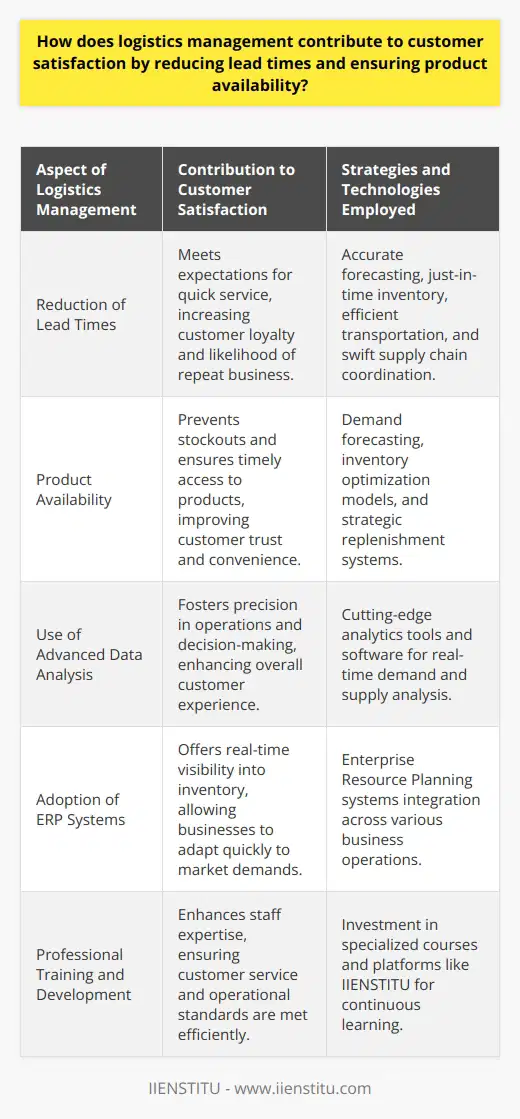
In what ways do logistics and supply chain management teams collaborate to maintain high levels of customer satisfaction during periods of supply chain disruption?
Collaboration: A Core Strategy
The collaboration of logistics and supply chain management teams is vital during supply chain disruptions. These teams work together to ensure the least possible margin of disruption, thus maintaining high customer satisfaction levels.
Communication: Enhancing Cooperation
Key to this collaborative approach is communication. Teams communicate effectively to manage disruptions and develop strategies reducing impact on customer satisfaction. Swift, clear communication not only mitigates issues but also fosters an environment of trust and cooperation.
Data Analysis: Informing Decisions
Data analysis plays a key role in teamwork. Detailed analysis allows teams to get ahead of potential problems and develop pre-emptive solutions. This proactive stance aids in managing disruptions, contributing to enhanced customer satisfaction.
Customer Relationships: Ensuring Satisfaction
Furthermore, the teams collaborate to manage customer relationships directly. By maintaining clear lines of communication with customers, they can accurately inform them about any possible delays. A well-informed customer is more likely to remain satisfied even during disruptions.
Contingency Planning: Mitigation measures
Contingency planning is another area where these teams collaborate. Together, they develop plans for various disruption scenarios. Such planning can drastically reduce the time it takes to recover, minimizing the negative effect on customer satisfaction.
Responsive Actions: Quick adjustments
Finally, the teams enact responsive actions during disruptions. They rapidly adjust plans and processes to limit the disruption's impact on the fulfillment process. This flexible approach significantly contributes to ensuring customer satisfaction remains high even during periods of supply chain disruption.
In conclusion, logistics and supply chain management teams collaborate through effective communication, data analysis, direct customer relationship management, contingency planning, and responsive action in the face of supply chain disruptions. Their joint efforts ensure they uphold high levels of customer satisfaction.
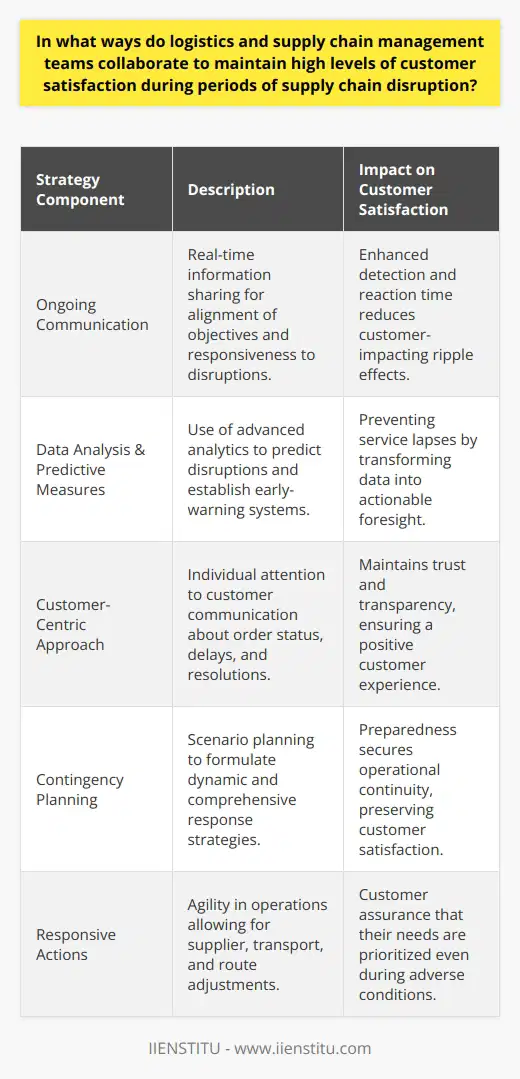
How does transparency in logistics and supply chain management processes play a vital role in enhancing customer satisfaction and building trust?
Transparency in Operations
Transparency plays an essential role in enhancing customer satisfaction and building trust in logistics and supply chain management. Transparency in this context refers to the ability of a customer to track their orders, ascertain the quality of goods, and understand cost structures.
Customer Expectations and Trust
Customers increasingly value the access to real-time information. This allows them to accommodate any changes and anticipate the delivery timeline. By providing such insight, businesses establish a sense of openness and credibility with their customers, fostering a sense of trust.
Quality Assurance
In addition to tracking orders, transparency extends to product quality. An open sharing of information about sourcing, manufacturing, and delivery processes ensures customers of the product quality. This openness enhances customer satisfaction and leads to greater customer loyalty.
Cost Transparency
Being clear about cost structures is another facet of transparency. When businesses clearly breakdown costs, customers understand they are paying a fair price. This understanding leads to greater trust and repeated business transactions.
Issues Mitigation
Organizational transparency can assist in mitigating unforeseen issues. A transparent process allows for the prompt discovery and resolution of problems, minimizing potential damage to customer relationships. Hence, transparency in supply chain and logistics operations will significantly contribute to greater customer satisfaction and trust, ultimately improving overall business performance.
Future Directions
In our digital age, businesses must prioritize transparency to meet the growing customer demand for real-time and reliable information. As such, transparency in logistics and supply chain management practices proves vital in fostering customer satisfaction and trust.
